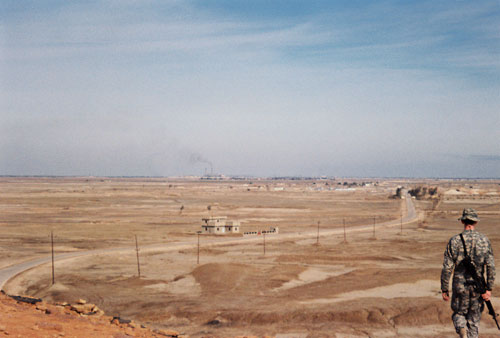Krafft ’09 Speaks on Iraq Experiences at N.Y. Museum

As a former U.S. Army sergeant, Max Krafft ’09 has a lot to say about his two stints serving in Iraq.
The English major was deployed in December 2005, and again in January 2007. On both occasions he was touring as the bass player and sound engineer for a rock/pop/country/R&B ensemble affiliated with the 389th Army Band.
“We were there to perform for the members of the military and government contractors who were stationed there during the holidays in an attempt to entertain them and boost their morale,” Krafft explains, regarding his role overseas.
Krafft, who lived and worked within 300 meters of a car bomb explosion and several mortar attacks, will share his thoughts on the War in Iraq as part of an exhibit at the New Museum in New York. The part-installation, part-conversation show titled “It Is What It Is: Conversations About Iraq,” and runs through March 22.
“Conversations” is commissioned by British artist Jeremy Deller and uses war artifacts and imagery to encourage discussion on the present circumstances in Iraq.
Artifacts shown at the exhibit include a remnant of a car that was destroyed in March 2007 by an explosion on Al-Mutanabbi; a handmade banner by artist Ed Hall, who is known for his work for trade unions and other interest groups; and wall graphic juxtaposing two maps—one of Iraq and one of the United States. This visual representation serves as a reminder of the disconnect between two countries that are intimately involved politically and economically, though geographically distanced.
Krafft is one of several participants in the show; he joins other veterans, journalists, scholars, and Iraqi nationals who have expertise in a particular aspect of the region and/or first-hand experience of Iraq.
Krafft says participating in the two deployments was not by choice, however, his initial decision to join the Army was motivated “at least in part by the knowledge that I would probably end up in Iraq at some point,” he says.
“I had the desire to witness the situation there firsthand, to see how it compared to the images that we are presented [with] in this country, and the kinds of narratives that the government and news agencies have constructed.”
Krafft served in various locations up and down the Eastern border and around Baghdad. He noticed conditions varied widely, as did people’s attitudes toward the occupation.
“Things seemed better in the countryside. It tended to be less violent the further from the cities we got, and the people there seemed happier to see us and like they were more or less going about with their lives in a normal fashion,” he recalls.
The two-time war veteran believes that motivations, both of the Iraqis and the Americans, are complex and varied. He understands the frustrations of both parties.
“I don’t think it’s a situation in which there is going to be any ‘victory,’ per se, and it would be difficult to say whether the changes that have occurred have been positive or negative overall,” Krafft says. “Regardless of whether or not we were justified in going there in the first place, I do think it’s time that we left and let the Iraqis handle their own affairs for a change.”
“It Is What It Is: Conversations About Iraq” is part of The Three M Project, a series organized by the New Museum, New York; the Museum of Contemporary Art, Chicago; and the Hammer Museum, Los Angeles, to commission, organize and co-present new works of art. The museums jointly commission, exhibit and acquire works of contemporary art by artists whose work has not yet received significant recognition. After the New Museum, “Conversations” will travel across the United States during a three-week road trip and make longer stops at the Hammer Museum in Los Angeles and the Museum of Contemporary Art in Chicago.
Krafft is in the process of writing a creative writing thesis that deals, at least in part, with his experiences in the military and the Middle East. He is currently assigned to the Individual Ready Reserve, and does not have plans to return to the Army after his enlistment contract ends in three years. After he graduates from Wesleyan, Krafft is considering pursuing a career in the culinary arts or possibly working in education. He also says that he would consider a career as an editor.
Kraft will be participating in the show between 3 and 6 p.m. March 7 and 22 at the New Museum.
“What I actually talk about will depend on the kinds of questions the visitors to the exhibit ask,” he says. “I encourage any Wesleyan alumni or students in the area to stop by.”

